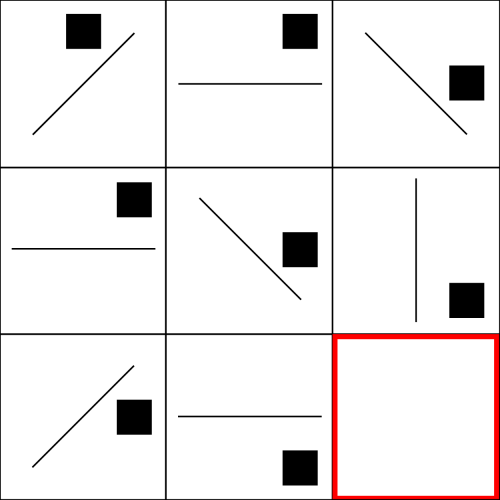Hagen Matrices Test (HMT)

The Hagen Matrices Tests are intelligence tests that are free for non-commercial use. The long-form HMT and the short form HMT-S are developed, validated, and established as web-based instruments. According to the Cattell-Horn-Carroll (CHC) model of intelligence, they measure fluid intelligence (Gf). The latest versions of the tests were developed by Dr. Timo Heydasch and M. Sc. Sara Tsantidis.
Kontakt: Sara Tsantidis M. Sc. Fernuni Hagen
Email: sara.tsantidis
-
HMT Long Version HMT-S Short Version Number of Tasks 20 6 Domain Gf, fluid intelligence, reasoning Gf, fluid intelligence, reasoning Difficulty high well-balanced Presentation web-based web-based Duration (incl. Instruction) 20 Minutes (25 Minutes) 5 Minutes (10 Minutes) Reliability .80 .60 Validity I-S-T 2000 R
reasoning .57
knowledge .38
memory .28
I-S-T 2000 R
reasoning .52
knowledge .31
memory .24
Language English, German, Spanish English, German, Spanish -
HMT & HMT-S (ZIP 2 MB)
The new HMT Design (PDF 283 KB)
-
Please cite the HMT:
- Heydasch, T., & Tsantidis, S. (in prep.) Comparison of the Hagen Matrices Test (HMT) and the short Version (HMT-S) with Ravens Advanced Progressive Matrices.
- Heydasch, T. (2014). The Hagen Matrices Test (HMT) (part of doctoral dissertation thesis). University of Hagen, Germany. https://doi.org/10.13140/RG.2.2.31433.75361
Please cite the HMT-S:
- Heydasch, T., & Tsantidis, S. (in prep.) Comparison of the Hagen Matrices Test (HMT) and the short Version (HMT-S) with Ravens Advanced Progressive Matrices.
- Heydasch, T., Haubrich, J., & Renner, K.-H. (2013). The Short Version of the Hagen Matrices Test (HMT–S): A 6-item induction intelligence test. Methods, Data, Analyses, MDA, 7, 183-208. https://doi.org/10.12758/mda.2013.011
- Heydasch, T., Haubrich, J. & Renner, K.-H. (2020). The Short Version of the Hagen Matrices Test (HMT-S). A 6-Item Induction Intelligence Test (T. Heydasch, Trans.). Methods, Data, Analyses, MDA, 7, 183e-205e. https://doi.org/10.12758/mda.2013.021
-
Some Publications with the HMT(-S)
- Guggemos, J. (2021). On the predictors of computational thinking and its growth at the high-school level. Computers & Education, 161, 104060. https://doi.org/10.1016/j.compedu.2020.104060
- Körner, R., Kammerhoff, J,. & Schütz, A. (2020). Who commands the little soldiers? A comparison of the personality traits of miniature wargame players with other gamers and non-gamers. Journal of Individual Differences. https://doi.org/10.1027/1614-0001/a000326
- Schäpers, P., Mussel, P., Lievens, F., König, C. J., Freudenstein, J.-P., & Krumm, S. (2020). The role of situations in situational judgment tests: Effects on construct saturation, predictive validity, and applicant perceptions. Journal of Applied Psychology, 105(8), 800-818. https://doi.org/10.1037/apl0000457
- Schmidt, F. T. C., Lechner, C. M., & Danner, D. (2020). New wine in an old bottle? A facet-level perspective on the added value of Grit over BFI–2 Conscientiousness. PLoS ONE, 15(2), e0228969. https://doi.org/10.1371/journal.pone.0228969
- Spurk, D., Volmer, J., Orth, M. B., & Göritz, A.S. (2020). How do career adaptability and proactive career behaviors interrelate over time? An inter- and intraindividual investigation. Journal of Occupational and Organizational Psychology, 93, 158-186. https://doi.org/10.1111/joop.12288
- von Adrian-Werbung, M. T. P., Adler, D., Schwab, F., Schwar, S., & LAnge, B., L. (2020). Can I confidently guess who you are? Personality and intelligence perception in online dating. Studies in Communication and Media, 9(4), 573-598. https://doi.org/10.5771/2192-4007-2020-4-573
- Wolff, C., & Keith, N. (2019). Motives relate to cooperation in social dilemmas but have an inconsistent association with leadership evaluation.Scientific Reports, 9, 10118. https://doi.org/10.1038/s41598-019-45931-4
- Nalis, D., Schütz, A., & Pastukhov, A. (2018). The Bamberg Trucking Game: A paradigm for assessing the detection of win-win solutions in a potential conflict scenario. Frontiers in Psychology, 9, 138. https://doi.org/10.3389/fpsyg.2018.00138
- Rammstedt, B., Lechner, C. M., & Danner, D. (2018). Relationships between personality and cognitive ability: A facet-level analysis. Journal of Intelligence, 6(28), 1-13. https://doi.org/10.3390/jintelligence6020028
- Schubert, A.-L., Hagemann, D., Frischkorn, G. T., & Herpertz, S. C. (2018). Faster, but not smarter: An experimental analysis of the relationship between mental speed and mental abilities. Intelligence, 71, 66-75. https://doi.org/10.1016/j.intell.2018.10.005
- Boecker, L., Loschelder, D. D., & Topolinski, S. (in press). How individuals react emotionally to others’ (mis)fortunes: A social comparison framework. Journal of Personality and Social Psychology. Advance online publication. https://doi.org/10.1037/pspa0000299
- de Rooij, A. (2022). Varieties of inner speech and creative potential. Imagination, Cognition and Personality. https://doi.org/10.1177/02762366211070999
- Hertz, U., Bell, V., & Raihani, N. (2021). Trusting and learning from others: immediate and long-term effects of learning from observation and advice. Proceedings of the Royal Society. B: Biological Sciences, 288. https://doi.org/10.1098/rspb.2021.1414
- Kraft, P., Kraft, B., Hagen, T., & Espeseth, T. (2022). Subjective Socioeconomic Status, Cognitive Abilities, and Personal Control: Associations With Health Behaviours. Frontiers in psychology, 12, 784758. https://doi.org/10.3389/fpsyg.2021.78475
- Körner, R., Heydasch, T. & Schütz, A. (2022) Dominance and Prestige as Self-Concept Facets, Journal of Personality Assessment, DOI: 10.1080/00223891.2022.2137028
Links
- HMT-S Summery
- HMT-S Development and Validation
- HMT(-S): Preview
- HMT Summery
- HMT Development and Validation
Sara Tsantidis
| 02.02.2026


